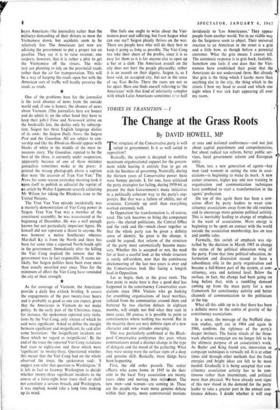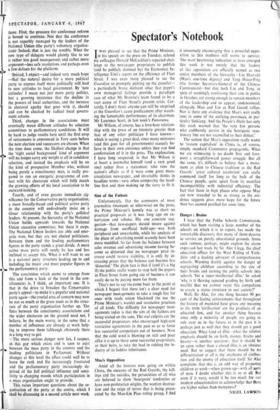The Change at the Grass Roots
TORIES IN TRANSITION —1
By DAVID HOWELL, MP
rr HE structure of the Conservative party is well I suited to government. Is it as well suited to opposition?
Basically, the system is designed to mobilise maximum organisational support for the govern-
ment while leaving it entirely free to get on
with the business of governing. Naturally, during the thirteen years of Conservative power there were bumpy periods. I, for one, have criticised the party strategists for failing, during 1959-64, to present the then Government's many initiatives in a politically coherent way to the party's sup- porters. But that was a failure of ability, not of structure. Certainly up until then everything worked extremely well.
In Opposition the transformation is, of course, total. The task becomes to bring the component parts—the elected politicians, the Central Office
and the rank and file—much closer together so that the whole party can be given a definite sense of identity. So great is the change, it
could be argued, that reform of the structure of the party must automatically become neces- sary. Whether this is accepted or not, the need for at least a careful look at the whole structure is surely self-evident, now that the continuous electioneering of the last two years is over and the Conservatives look like facing a longish haul in Opposition.
Let us begin, then, at the grass roots. The first point to make here is that a good deal has happened in the constituency Conservative asso- ciations since 1964. Visitors who go looking for crumbling organisations of local worthies, isolated from the communities around them and battered by two election defeats in eighteen months, will simply not find what they seek in most cases. Of course, it is possible to point to constituencies where nothing has moved. But in the majority there are very definite signs of a new character and new attitudes emerging.
This was particularly confirmed at the Black- pool Conservative conference this year, where commentators noted a distinct change in the type of delegate and the mood of the gathering. What they were seeing were the surface signs of a deep and genuine shift. Basically, three things have been happening.
First, the old order passeth; The senior officers who came home in 1945 to do their stint in the local Tory association are twenty years older and moving into retireAient. The new men—and women—are coming in. These are the people who want more genuine debate within their party, more controversial motions
at area and national conferences—and not just about capital punishment and comprehensives, but about radical tax reform, better public ser- vices, local government reform and European unity.
Then, too, a new generation of agents—key men (and women) in setting the tone in asso- ciations—is beginning to make its mark. A new career structure, higher pay and new training in organisation and communication techniques have combined to start a transformation in the agents' profession.
On top of this again there has been a con- scious effort by party leaders to wean con- stituency associations away from the old routines and to encourage more genuine political activity. This is inevitably leading to change of emphasis in the work of associations. More energy is beginning to be spent on contact with the world outside the association membership, less on teas and jumble sales.
Formally, this switch of emphasis was sig- nalled by the decision in March 1965 to change the status of the political education wing of the party. From that time political education, in- formation and discussion ceased to have a subordinate role in the party organisation and became a full-blown part of the system, at con- ,,0.
stituency, area and national level. Below the surface, in fact, the change had been going on long before that, with a rumbling demand coming up from the mass party for a new framework for constituency activity and better channels of communication to the politicians at the top.
What all this adds up to is that there has been a definite move in the centre of gravity of the constituency associations.
In a sense, the message of the Nuffield elec- tion studies, spelt out in 1964 and again in 1966, confirms the rightness of the party's deeper instincts. The hectic rituals of the three. week election campaign are no longer felt to be the ultimate purpose of an association's work; As Butler and King found out, innovation in campaign techniques is virtually nil. It is at other times and through other methods that the fresh energies and bright ideas are felt to be most needed. Gradually it is being accepted that con- stituency association activity has to be con- tinuous rather than intermittent, and political more than physical. We have already seen signs of this new mood in the demand for the party leader to take a greater part in the annual con- ference debates. I doubt whether it will stop there. Fast, the- pressure ,for conference reform is bound to continue.. Not that the conference is not superbly managed by the leaders of the National Union (the party's voluntary organisa- tion): Indeed; :that is just the trouble. What the new :type of delegate would plainly like to see is rather less good management and rather more argument—less safe resolutions and perhaps even .a few defeats for the platform.
' fond, I etpect—and indeed very much hope —lit' the 'natural desire for a more political party to express itself more politically will lead to new attitudes to local government. By 'new attitudes' I mean not just more party politics, but a growing insistence that the decline in the powers of local authorities, and the increase in electoral apathy that goes with it, should and can be checked by radical local govern- ment reform.
Third, changes in the associations must eventually mean different attitudes by selection committees to parliamentary candidates. It will be hard to judge results here until the first crop of retirements is announced in Tory seats before the next election and successors are chosen. When the time does come, the likeliest change is that the 'right social background' kind of argument will no longer carry any weight at all in candidate selection, and instead the emphasis will be on the kind of prospective Member who, without being purely a- constituency man, is really pre- pared to run an energetic programme of con- tact with his electorate which will fully match the growing efforts of his local association to be outward-looking.
Fourth, and of even greater immediate sig- nificance for the Conservative party organisation, a more broadly-based and political active party in the country will undoubtedly insist on a closer relationship with the party's political leaders. At present, the hierarchy of the National Union builds upwards towards the National Union executive committee,- but there it stops. The National Union leaders are able and ener- getic men, but they are not elected politicians. Between them and the leading parliamentary figures in the party stands a great divide. A more active mass party will surely be less and less inclined to accept this. What it will want to see is a national party structure leading up to and including the major and most popular figures in the parliamentary party.
The conclusion which seems to emerge from this and from a look at the trend in the con- stituencies is, I think, an important one. It is that in the drive to broaden the Conservative party's appeal—to make it a popular and national party again—the crucial area of concern may now be not so much at the grass roots as in the struc- ture of the party organisation further up. The links between the constituency associations and the wider electorate on the ground need not, I believe, be the main worry, in the sense that a number of influences are already at work help- ing to improve them (although obviously there is a long way to go).
The more serious danger now lies, I suspect, in this gap which exists and is seen to exist between the mass party in the country and the leading politicians in Parliament. Without changes at this level the effect could well be to leave the rank and file increasingly frustrated and the parliamentary party increasingly de- prived of the full political influence and sensi- tivity to changing moods which participation in a mass organisation ought to provide.
This raises important questions about the or- ganisation of the party at the centre, which I shall be discussing in a second article next week.































 Previous page
Previous page